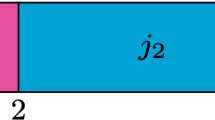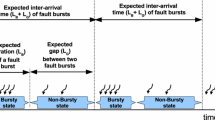Abstract
The design and analysis of real-time scheduling algorithms for safety-critical systems is a challenging problem due to the temporal dependencies among different design constraints. This paper considers scheduling sporadic tasks with three interrelated design constraints: (i) meeting the hard deadlines of application tasks, (ii) providing fault tolerance by executing backups, and (iii) respecting the criticality of each task to facilitate system’s certification. First, a new approach to model mixed-criticality systems from the perspective of fault tolerance is proposed. Second, a uniprocessor fixed-priority scheduling algorithm, called fault-tolerant mixed-criticality (FTMC) scheduling, is designed for the proposed model. The FTMC algorithm executes backups to recover from task errors caused by hardware or software faults. Third, a sufficient schedulability test is derived, when satisfied for a (mixed-criticality) task set, guarantees that all deadlines are met even if backups are executed to recover from errors. Finally, evaluations illustrate the effectiveness of the proposed test.












Similar content being viewed by others
Notes
An interval is called level-i busy period if task \(\tau _i\) and its higher priority jobs continuously execute in that interval. A more formal definition of busy period will be provided later.
A task is runnable if it has been released but has not completed its execution.
The term “task errors” here refers to errors in the primary and backups of one job of task \(\tau _{i} \), i.e., errors are considered to be detected at the job level; not at task level.
If the relative deadline of each task in a task set is less than or equal to its period, then the task set is called a constrained-deadline task system. If the relative deadline of each task is exactly equal to its period, then the task set is called an implicit-deadline task system.
The \(h{th}\) job of task \(\tau _{k} \) is denoted by \(J_k^h\).
References
Aidemark J, Folkesson P, Karlsson J (2005) A framework for node-level Ffault tolerance in distributed real-time systems. In: Proceedings of the international conference on dependable systems and networks, pp 656–665
Al-Asaad H, Murray BT, Hayes JP (1998) Online BIST for embedded systems. IEEE Des Test 15(4):17–24. doi:10.1109/54.735923
Audsley NC (2001) On priority assignment in fixed priority scheduling. Inf Proc Lett 79(1):39–44
Audsley NC, Burns A, Richardson MF, Wellings AJ (1991) Hard real-time scheduling: the deadline-monotonic approach. In: Proc. IEEE workshop on real-time operating systems and software, pp 133–137
Audsley N, Burns A, Richardson M, Tindell K, Wellings AJ (1993) Applying new scheduling theory to static priority pre-emptive scheduling. Softw Eng J 8(5):284–292 ISSN 0268–6961
Avižienis A, Laprie J-C, Randell B, Landwehr C (2004) Basic concepts and taxonomy of dependable and secure computing. IEEE Trans Depend Sec Compt 1(1):11–33. doi:10.1109/TDSC.2004.2 ISSN 1545–5971
Aydin H (2007) Exact fault-sensitive feasibility analysis of real-time tasks. IEEE Trans Compt 56(10):1372–1386. doi:10.1109/TC.2007.70739 ISSN 0018–9340
Barhorst J, Belote T, Binns P, Hoffman J, Paunicka J, Sarathy P, Stanfill JSP, Stuart D, Urzi R (2009) In white paper: a research agenda for mixed-criticality systems. https://www.cs.unc.edu/~mollison/pubs/icess10.pdf. Accessed 5 Mar 2010
Baruah S, Fohler G (2011) Certification-cognizant time-triggered scheduling of mixed-criticality systems. In: Proc. of RTSS, pp 3–12
Baruah S, Vestal S (2008) Schedulability analysis of sporadic tasks with multiple criticality specifications. In: Proc. of ECRTS, pp 147–155
Baruah S, Rosier LE, Howell RR (1990a) Algorithms and complexity concerning the preemptive scheduling of periodic, real-time tasks on one processor. Real-Time Syst 2(4):301–324. doi:10.1007/BF01995675 ISSN 0922–6443
Baruah SK, Mok AK, Rosier LE (1990b) Preemptively scheduling hard-real-time sporadic tasks on one processor. In: Proc. of the RTSS, pp 182–190
Baruah S, Li H, Stougie L (2010) Towards the design of certifiable mixed-criticality systems. In: Proc. of RTAS
Baruah S, Bonifaci V, D’Angelo G, Marchetti-Spaccamela A, Van Der Ster S, Stougie L (2011a) Mixed-criticality scheduling of sporadic task systems. In: Proc. of the European conf. on algorithms, pp 555–566
Baruah S, Burns A, Davis R (2011b) Response-time analysis for mixed criticality systems. In: Proc. of RTSS
Baruah S, Bonifaci V, D’Angelo G, Li H, Marchetti-Spaccamela A, Megow N, Stougie L (2012a) Scheduling real-time mixed-criticality jobs. IEEE Trans Comput 61(8):1140–1152
Baruah S, Bonifaci V, D’Angelo G, Li H, Marchetti-Spaccamela A, van der Ster S, Stougie L (2012b) The preemptive uniprocessor scheduling of mixed-criticality implicit-deadline sporadic task systems, In: Proc of ECRTS
Baumann R (2005) Soft errors in advanced computer systems. IEEE Des Test Comput 22(3):258–266
Bini E, Buttazzo G (2005) Measuring the performance of schedulability tests. Real-Time Syst 30:129–154
Burns A, Davis R, Punnekkat S (1996) Feasibility analysis of fault-tolerant real-time task sets. In: Proc. of the ECRTS, pp 522–527
Campbell A, McDonald P, Ray K (1992) Single event upset rates in space. IEEE Trans Nuclear Sci 39(6):1828–1835. doi:10.1109/23.211373 ISSN 0018–9499
Castillo X, McConnel R, Siewiorek DP (1982) Derivation and calibration of a transient error reliability model. IEEE Trans Comput 37(7):658–671. doi:10.1109/TC.1982.1676063 ISSN 0018–9340
Chattopadhyay S, Kee CL, Roychoudhury A, Kelter T, Marwedel P, Falk H (2012) A unified WCET analysis framework for multi-core platforms. In: Proc. of the RTAS, pp 99–108
Chetto H, Chetto M (1989) Some results of the earliest deadline scheduling algorithm. IEEE Trans Softw Eng 15(10):1261–1269. doi:10.1109/TSE.1989.559777 ISSN 0098–5589
Davis R, Burns A (2009) Priority assignment for global fixed priority pre-emptive scheduling in multiprocessor real-time systems. In: Proc. of RTSS, pp 398–409
de Lima GM, Burns A (2003) An optimal fixed-priority assignment algorithm for supporting fault-tolerant hard real-time systems. IEEE Trans Comput 52(10):1332–1346
de Niz D, Lakshmanan K, Rajkumar R (2009) On the scheduling of mixed-criticality real-time task sets. In: Proc. of the RTSS, pp 291–300
Dorin F, Richard P, Richard M, Goossens J (2010) Schedulability and sensitivity analysis of multiple criticality tasks with fixed-priorities. Real-Time Syst 46:305–331
Ekberg P, Yi W (2012) Bounding and shaping the demand of mixed-criticality sporadic tasks. In: Proc. of the ECRTS
Ghosh S, Melhem R, Mossé D (1995) Enhancing real-time schedules to tolerate transient faults. In: Proc. of the RTSS, pp 120–129
Guan N, Ekberg P, Stigge M, Yi W (2011) Effective and efficient scheduling of certifiable mixed-criticality sporadic task systems. In: Proc. of RTSS, pp 13–23
Guan N, Lv M, Yi W, Yu G (2012) WCET analysis with MRU caches: challenging LRU for predictability. In: Proc. of RTAS, pp 55–64
Han C-C, Shin KG, Wu J (2003) A fault-tolerant scheduling algorithm for real-time periodic tasks with possible software faults. IEEE Trans Compt 52(3):362–372. doi:10.1109/TC.2003.1183950 ISSN 0018–9340
Hiller M (2000) Executable assertions for detecting data errors in embedded control systems. In: Proc. of the DSN
Huynh BK, Ju L, Roychoudhury A (2011) Scope-aware data cache analysis for WCET estimation. In: Proc. of the RTAS, pp 203–212
Iyer RK, Rossetti DJ, Hsueh MC (1986) Measurement and modeling of computer reliability as affected by system activity. ACM Trans Compt Syst 4(3):214–237 ISSN 0734–2071
Jhumka A, Hiller M, Claesson V, Suri N (2002) On systematic design of globally consistent executable assertions in embedded software. In: Proceedings of the joint conference on Languages, compilers and tools for embedded systems, pp 75–84
Kalla R, Sinharoy B, Starke WJ, Floyd M (2010) Power 7: ibm’s next-generation server processor. Micro IEEE 30(2):7–15
Koren I, Krishna CM (2007) Fault-tolerant systems. Morgan Kaufmann
Lakshmanan K, de Niz D, Rajkumar R, Moreno G (2010) Resource allocation in distributed mixed-criticality cyber-physical systems. In: Proc. of the ICDCS, pp 169–178
Lakshmanan K, de Niz D, Rajkumar R (2011) Mixed-criticality task synchronization in zero-slack scheduling. In: Proc. of RTAS, pp 47–56
Leung JYT, Whitehead J (1982) On the complexity of fixed-priority scheduling of periodic real-time tasks. Perform Eval 2:237–250
Li H, Baruah S (2010a) Load-based schedulability analysis of certifiable mixed-criticality systems. In: Proc. of EMSOFT, pp 99–108
Li H, Baruah S (2010b) An algorithm for scheduling certifiable mixed-criticality sporadic task systems. In: Proc. of RTSS, pp 183–192
Liberato F, Melhem R, Mossé D (2000) Tolerance to multiple transient faults for aperiodic tasks in hard real-time systems. IEEE Trans Compt 49(9):906–914
Madeira H, Camoes J, Silva JG (1991) A watchdog processor for concurrent error detection in multiple processor systems. Microprocess Microsyst 15(3):123–130
Many F, Doose D (2011) Scheduling Analysis under Fault Bursts. In: Proc. of the RTAS, pp 113–122
Meixner A, Bauer ME, Sorin DJ (2007) Argus: low-cost, comprehensive error detection in simple cores. In: Proc. of the annual IEEE/ACM int. symp. on Microarchitecture, pp 210–222
Mok AK, Feng X, Chen D (2001) Resource partition for real-time systems. In: Proc. of the RTAS, p 75
Mollison MS, Erickson JP, Anderson JH, Baruah SK, Scoredos JA (2010) Mixed-criticality real-time scheduling for multicore systems. In: Proc. of ICESS, pp 1864–1871
Pandya M, Malek M (1998) Minimum achievable utilization for fault-tolerant processing of periodic tasks. IEEE Trans Compt 47(10):1102–1112. doi:10.1109/12.729793 ISSN 0018–9340
Pathan RM (2012) Schedulability analysis of mixed-criticality systems on multiprocessors. In: Proc. of ECRTS, pp 309–320
Pellizzoni R, Meredith P, Caccamo M, Rosu G (2008) Hardware runtime monitoring for dependable COTS-based real-time embedded systems, In: Proc of the RTSS
Pellizzoni R, Meredith P, Nam M, Sun M, Caccamo M, Sha L (2009) Handling mixed-criticality in soc-based real-time embedded systems. In: Proc. of EMSOFT
Petters SM, Heffernan M, Elphinstone K (2009) Towards real multi-criticality scheduling. In: Proc. of RTCSA, pp 155–164
Punnekkat S, Burns A, Davis R (2001) Analysis of checkpointing for real-time systems. Real-Time Syst 20(1):83–102. doi:10.1023/A:1026589200419 ISSN 0922–6443
Raju SCV, Rajkumar R, Jahanian F (1992) Monitoring timing constraints in distributed real-time systems. In: Proc. of the RTSS, pp 57–67
Santy F, George L, Thierry P, Goossens J (2012) Relaxing mixed-criticality scheduling strictness for task sets scheduled with FP. In: Proc. pf the ECRTS, pp 155–165
Shivakumar P, Kistler M, Keckler SW, Burger D, Alvisi L (2002) Modeling the effect of technology trends on the soft error rate of combinational logic. In: Proc. of the DSN, pp 389–398
Short M, Proenza J (2013) Towards efficient probabilistic scheduling guarantees for real-time systems subject to random errors and random bursts of errors. InL Proc. of the ECRTS, pp 259–268. doi:10.1109/ECRTS.2013.35
Siewiorek DP, Kini V, Mashburn H, McConnel S, Tsao M (1978) Experiences with fault tolerance in multiprocessor systems. Proc IEEE 66(10):1199 ISSN 0018–9219
Srinivasan J, Adve SV, Bose P, Rivers JA (2004) The impact of technology scaling on lifetime reliability. In: Proceedings of the international conference on dependable systems and networks, pp 177–186
Tamas-Selicean D, Pop P (2011) Design optimization of mixed-criticality real-time applications on cost-constrained partitioned architectures. In: Proc. of RTSS, pp 24–33
Vestal (2007) Preemptive scheduling of multi-criticality systems with varying degrees of execution time assurance. In: Proc. of RTSS, pp 239–243
Yoon M, Kim J, Sha L (2011) Optimizing tunable wcet with shared resource allocation and arbitration in hard real-time multicore systems. In: Proc. of the RTSS, pp 227–238
Author information
Authors and Affiliations
Corresponding author
Rights and permissions
About this article
Cite this article
Pathan, R.M. Fault-tolerant and real-time scheduling for mixed-criticality systems. Real-Time Syst 50, 509–547 (2014). https://doi.org/10.1007/s11241-014-9202-z
Published:
Issue Date:
DOI: https://doi.org/10.1007/s11241-014-9202-z




